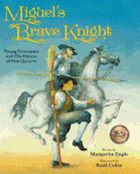
Miguel de Cervantes survived his onerous childhood--his gambler father's imprisonments, his family's constant fleeing from debtors--by losing himself in stories. Inspired by his mother's tales, "dazzling plays" and "storytellers on street corners," Miguel imagines he will someday conjure his own "adventures/ of a knight who roams toward a deep/ blue lake.../ a towering mountain.../ a glittering/ cave...." Despite his lack of books, Miguel creates a "world/ of brave/ daydreams" that sustain him through plague, famine and disaster after disaster. His Don Quixote and "his chubby friend" will go "forth boldly... to right/ all the wrongs/ of this wonderful/ but terribly/ mixed up/ world."
Margarita Engle (The Wild Book) and Raúl Colón (Draw!) combine their formidable strengths to create Miguel's First Knight, an inspiring story of tenacious hope and indelible grit. Engle's thoughtful, first-person verses give voice to "the man who dreamed Don Quixote into existence." Artist Colón's sweeping "pen and ink and watercolor" spreads, in a muted palette of browns, greens and yellows, suggests a sense of long-ago history, while his characters' expressions add immediacy: the Cervantes siblings' joy performing their "fanciful world," Miguel's wide-eyed hope when he returns to school, Miguel's mother's beleaguered resignation over the family's next escape.
The final page states that "Cervantes is widely regarded as the creator of the first modern novel." Published in 1605, Don Quixote is indeed the first Western novel, but Murasaki Shikibu's Tale of Genji debuted circa 1010. Numbers aside, what shines forth is the power of imagination to transcend hardship and injustice. As portals to creativity, Engle and Colón prove how "[s]ome daydreams really do/ come true." --Terry Hong, Smithsonian BookDragon

